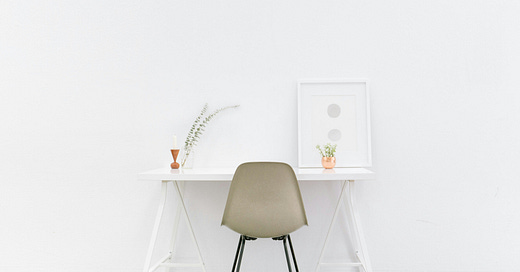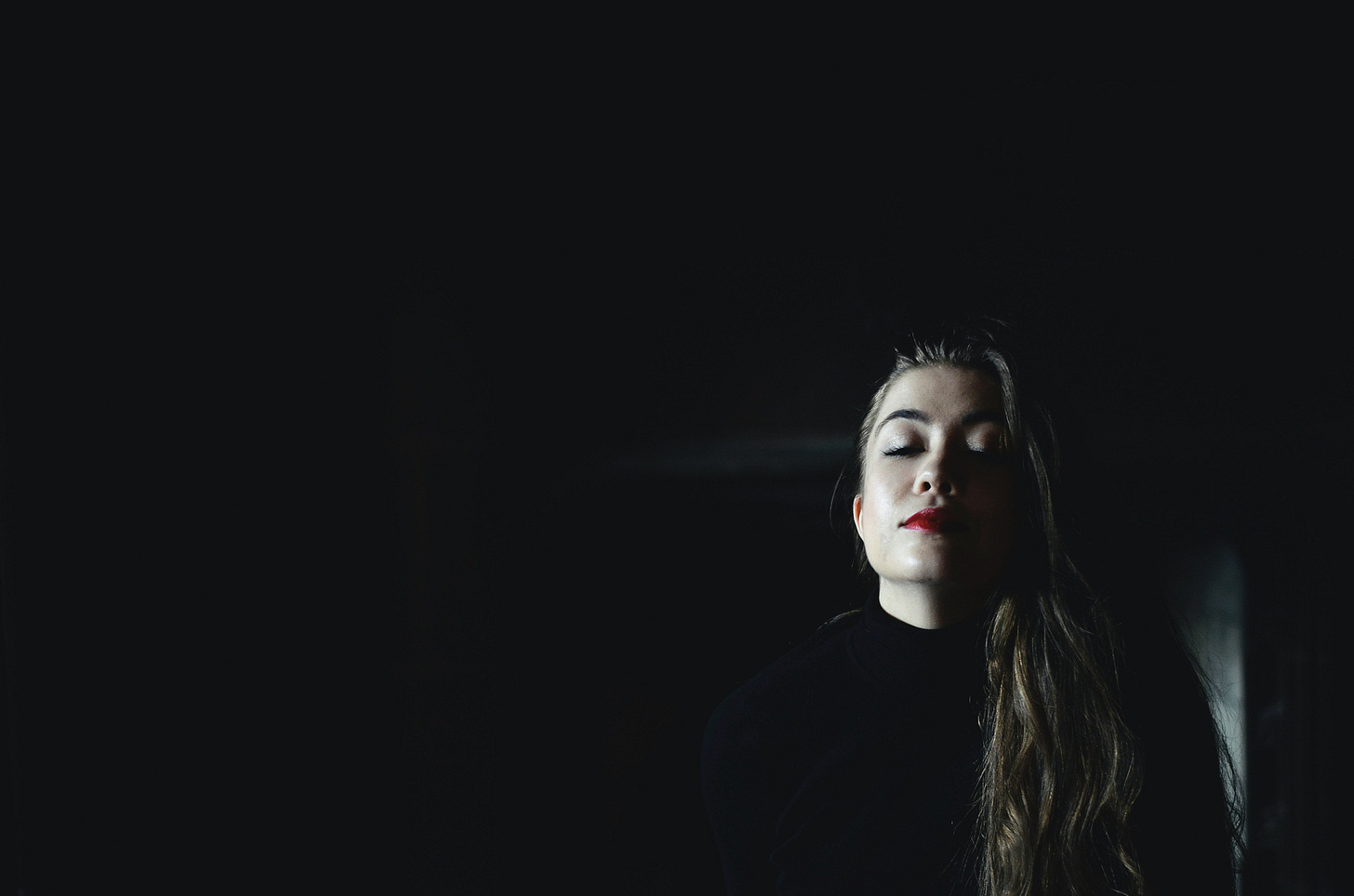The following is the first part of a 12 week series based on the book 12 Tiny Things: Simple Ways to Live a More Intentional Life.1 For the next 12 (or so…) weeks we’ll be focusing on the 12 themes outlined in the book: Space, Work, Spirituality, Food, Style, Home, Sensuality, Nature, Creativity, Communication, Learning, and Community. Each offering will include a new reflection or deleted scenes2 book excerpt along with a worksheet and audio exercise to help you delve more fully into the theme in your own life.
First up, we create space.
Clutter drives me nuts. I know I’m not alone in this phenomenon, but I think the influence that clutter has on me is getting stronger as I age. I used to be able to leave dishes in the sink or a coat on the floor or papers all over my desk and not bat an eye. Now when there is excess stuff in my immediate area, or even in an area that I can’t see but that I know is cluttered, I feel anxious and a little twitchy. On Saturdays I have a pattern of swooping around the house, first picking up everything that’s on the floor or out of its designated area, then vacuuming, then pretending to dust, then moving more items around in an effort to free up some space. I always feel better when it’s done. But it always needs to be done. There always seems to be something extra taking up the space that I want to be empty.
Several years ago, I heard Buddhist teacher Cynthia Jurs speak. What stood out to me most was the way she spoke of "acting from the subtle" and how important it can be to stop and breathe in the midst of the chaos that seems to punctuate our world more than we want it to. She spoke of focusing on the space that is in between where we are and where we want to go. She said it’s that in between space that allows new things to come into being.
After about three minutes into our first coaching session, it was evident that my new client Sue was feeling completely overwhelmed. She said her life felt like it was spinning more quickly than she had the capacity to handle: her job was demanding 50+ hours a week, her children had a lot of extra activities she wanted to support, and she just placed her mother in an assisted living center. She was activity managing a new MS dianosis, and now she had to complete some “healthy living goals” to keep her insurance premiums from going up. Her blood pressure was elevated at her employer’s health screening event and her BMI came in at over 30. She didn’t want to talk to me, and she felt pushed into yet another thing that she felt she couldn’t control and didn’t have time for.
As modern life speeds up and demands on time and energy overshadow the resources we perceive to be available, this scenario becomes more common. In a ‘perfect’ world, everyone would be excited about the opportunity to work with a health coach to set goals around making lifestyle changes. (Actually, in a ‘perfect’ world, health coaching wouldn’t be needed at all, but that’s a subject for another day.) But since our world is far from perfect, there are health coaches galore3, and we work with people who are overwhelmed. There are people who can’t see the light at the end of the tunnel because the tunnel it so long and twisty and they keep dropping their flashlight. Many folks are in really difficult life situations or are unhappy even when it seems like they have everything they need. Some are downright angry about having to take the time to focus on their own health. I imagine you can relate to what so many people express: They want more of something and it feels like what they have to give is never quite enough.
I listened to Sue lament the fact that she was taking 20 minutes out of her busy day to talk to me when she could be catching up on something else. I listened to her vent about her boss’s demands and how she doesn’t feel supported by her siblings in her decision to move her mom to a care center. I listened to her annoyance at being “punished” by her employer for being overweight and the shame that rode along with that feeling. I listened to her sadness that her mom doesn’t have the ability to care for her own physical needs anymore. And I listened to her desire to feel good enough to care for her sick dog and paint her young son’s bedroom his favorite color (orange).
What came out is that she doesn’t feel like she has the ability to prioritize what truly matters to her. She doesn’t feel like she’s got the space she needs to have in her life. Work takes time, the commute to work takes time, cooking healthy meals takes time, living itself takes time. Sometimes the things that take time overlap with the things that matter, but too often she is finding herself swept away in the overwhelming cloud of to-dos.
She wants some breathing room.
There are no easy answers. After Sue was done sharing what she wanted to share, I acknowledged her frustration and told her that I can only imagine what it’s like to be in her shoes, but that it sounds really, really hard. I said I admired her courage to share her story honestly with a stranger. I told her how to track the online goals that she’d set a few weeks ago, but I also told her not to worry about it, that I can update it for her if it feels like too much. And at the end of the call I invited her to take a deep breath with me—to literally put her hand on her belly and breathe in and hold it for a count of three and then let it go. It felt awkward to ask her if she’d do it, but she did. For those moments on the phone when she was breathing in for a count of three, holding, and letting go, she had space. That pause, in that moment, was enough. Before we hung up, she said she’d do it again—that she’d take a deep breath and pause—next time she felt like things were spinning out of control.
Inner clutter isn’t as easy to identify as the stacks of old papers, little trinkets, and plastic toys that tend to accumulate over the years. But inner clutter — those thoughts that get all jumbled up, pushed around, and oftentimes, never really dealt with — happens to the best of us. [i.e. everyone] There are times when I catch myself stuck in an old negative thought pattern and have to literally shake myself out of it, or it’ll overshadow my entire day.
I have a running commentary going in my mind pretty much all the time, and I don’t think I’m alone in this. In mindfulness based meditation, participants are taught to step outside those continuous thoughts and observe them, without judgment. It’s harder than it sounds, as anyone who has tried it knows. But when we can get to a place where we are able to see the stories we tell ourselves, we can start to take control of the story. We can start to become the author. We can remember that we have the capacity to choose how we perceive what is happening in our lives, and we can claim the power that resides in that knowing.4
With all of these stories that we tell ourselves, as we claim ownership, we can let go of the parts are simply aren’t true for us. We can clear out the clutter. Maybe the stories were true once, but we can start to recognize that they aren’t set in stone — we have the capacity to adapt or start a new chapter. We can learn to say no when saying no is the best answer.
I look to my right, and I see an old bill that I already paid online, two phone chargers, some guitar chord charts, and a thumb drive. To my left, I see a stack of library books, five magazines, Eva’s latest pile of art supplies, and a cloth napkin. Behind me I know there is a blanket, the empty firewood carrier, and a hammer. It feels too cluttered, and I sense myself growing frustrated and wanting to have more empty space. A clutter-free home. More organization. Fewer odds and ends laying around. Less stuff. I pick up the old bill and put it in the wood stove. It bursts into flames, and as it transforms from paper to ash, I remember to notice the space that is between where I am and where I want to be.
Sometimes where I am is punctuated by clutter, but sometimes where I am is still and gloriously empty and open. Sometimes the moments that make up my life are both cluttered and still and empty and open, and they are beautiful because of that contrast. With each step I take, I am allowing whatever space I’m in to move me into the next moment; into the next opportunity for preserving the space I need to feel rooted.
We need empty space in our physical plane, and we need to allow ourselves to slow down enough to cultivate that sort of space in our minds, as well. As Wendell Berry advises, “Don't own so much clutter that you will be relieved to see your house catch fire.” Like Mr. Berry, I prefer to [at least try to] live in a way that prevents feelings of relief upon seeing things catch on fire, literally or figuratively. But if something needs to go, let us all embrace the ashes along with the new space that remains in their wake. Then perhaps on a quiet day we’ll be able to see the other world that exists in the open space, and a whole new way of being will open up, one that we can hear in the pause between every breath.
The above audio is a short tension release exercise, and below is a worksheet to deepen your own practice of cultivating space:
This is my first foray into offering a paid subscribers only offering—I have a little more time than usual (at least at this writing..), and less cash flow, so it’s worth a go. In the future, I may make all of these upcoming weeks free, but for now, I appreciate any additional financial support for this writing work that I’ve done for free for so long. Here’s to getting paid for doing the things that truly matter to you, eh?
This means a draft of part of the chapter that didn’t make it into the final. There may be similarities or a sentence or two you recognize if you’ve read the book, but mostly these deleted scenes were either edited out or reworked.
Many of whom have been laid off from various health management companies and start ups in the last 2-3 years.
Of course, the very real issues that persist in our world make choosing how one perceives what is happening extremely challenging for many groups of people. Many things that are happening are terrible and inhumane and need to stop. Injustice and systematic oppression are part of the story, whether we like it or not. Ceasefires are the only way forward toward peace for all.





